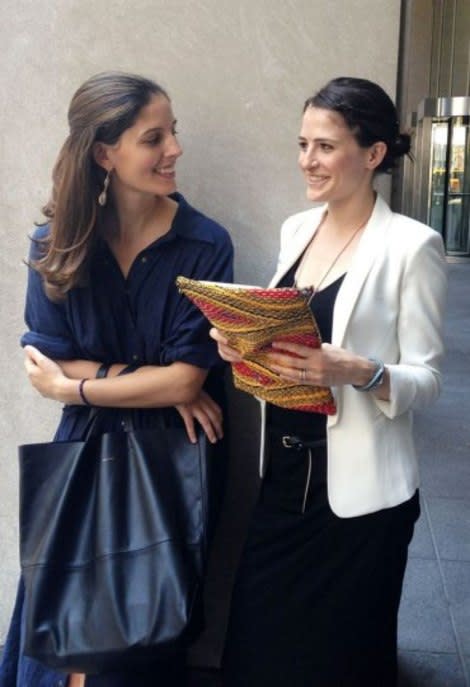Can Fast Fashion and Ethics Co-Exist?
Mattie Kahn

Like so many others in the fashion industry, Soraya Darabi and Maxine Bédat are fixated on labels. But while their peers lust after designer hang tags, this duo is more concerned with what gets printed below the brand name. Frustrated by "fast fashion"-the mass production of lesser-quality products in foreign countries-they've worked together to create Zady, an upcoming online shop that sells ethically sourced fashion and accessories.
Darabi and Bédat are hardly strangers to such projects. Once the social-media manager of The New York Times, Darabi co-founded FoodSpotting-a mobile app that reportedly sold to OpenTable for $10 million. Meanwhile, as a law student, Bédat imagined the Bootstrap Project, a nonprofit dedicated to creating a sustainable platform for global artisan goods.
VF Daily sat down with Zady's co-founders to talk about the downsides of mass production, the shifting definition of luxury, and why we should adopt our grandmothers' thriftiness.
See more: 2013 International Best-Dressed List
Highlights from our chat:
VF Daily: How do you verify where designers' clothing is coming from?
Soraya Darabi: We're selling 35 brands on Zady when we launch, and those 35 have been vetted very carefully. Once we pick a brand, we ask them to sign a certificate identifying, typically, the products [of theirs] we're selling, where the brand is headquartered, where the items were designed, and where the items were manufactured. Taking it a step further, we'll do a second interview once they've signed off on that, detailing specifically where the raw materials come from for the items that we're selling. We go in depth in the interview, which eventually becomes a story that we write up.
What kinds of stories are you hoping to tell?
Darabi: With Imogene + Willie, for instance, we tell the story of Carrie and Matt-a husband and wife from Henderson, Kentucky, that met in the third grade at a pool party. When Matt saw Carrie in third grade, he immediately fell in love with her, because she was, like, the first taste of freedom he had after a summer of being grounded. . . . They moved apart from each other, eventually moved back home, decided to get married, started a denim company named after their grandparents, and moved their headquarters to Nashville, Tennessee, where-for the first couple of years-they knew every single customer who came into their store. It was so important to them to feel as though their jeans were going into good hands. We want to give them that same chance to feel connected to their customers.
See more: Celebs Bare All: Lady Gaga, Angelina Jolie, Jennifer Aniston Go Nude
The issue of supply chains and production in general is framed in terms of the human and environmental cost of fast fashion. Do you think that there is any way for fast fashion to be responsible?
Maxine Bédat: I mean, even five years ago it would be unimaginable to think that Walmart would carry organic food, that that would be anything that they would ever prioritize. But because the customers have demanded that, they've gone there. I think that fast-fashion companies-even those that have made their mark on the cheapest lowest common denominator-in order to be relevant in the future, they're going to have to change. The ones that will be successful will be the ones that find more sustainable options.
To that end, would you classify Zady as a luxury marketplace?
Bédat: There used to be this whole middle market, right? That was where we bought our clothes, and it was only once "fast fashion" came in that that middle market disappeared. The middle market was focused on really beautifully made but accessibly priced products. I think we kind of fit in that territory. We want to be accessible. [Zady] is not going to be the cheapest in terms of price point, but hopefully, in terms of price per wear, we'll have the best bang for your buck.
Darabi: When [my sister] and I went to college, [my grandmother's] gift to her granddaughters was a sewing kit, because she felt so strongly that clothing shouldn't be discarded and treated cheaply. That's a Depression-era mentality. I'm not exactly sure why that mentality didn't stick around. It's so practical, and it ended up being true. When she passed away, we inherited her clothing, and some of my favorite pieces are pieces that my grandmother bought probably in the 60s. What we're trying to do is help people who want to live in a healthy way-both in the way they eat, the way that they exercise, and, of course, the way that they shop and care about fashion.
See more: Pippa Middleton's Guide to Cricket
So in terms of that ethos of investing in quality pieces, what's the last thing you two bought that you can't take off and isn't any worse for the wear?
Bédat: Almost every day I wear my Imogene + Willie jeans.
Darabi: I wear my Marisa Haskell earrings every day. They're hand-hammered brass. You can't get more local than the way Marisa makes her jewelry. She buys the brass locally at her hardware store; she designs and hand-hammers the brass in her studio. The designs are just so quirky and cool that I find myself putting on her dangly earrings every day.
See more from Vanity Fair:
Kate Middleton: Best-Dressed Pregnant Lady?
Two Decades of Brad Pitt
Jennifer Lawrence vs. Emma Watson: Who's the Most Stylish Actress Under 30?
Royal Babies: Infants in the House of Windsor

